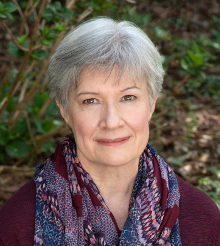Who Will Tell Your Story?
by Kathryn Schwille
 Every story or novel has a narrator, and the identity of that narrator is the most important decision a fiction writer makes about her work. The narrator is a like a character, whether she takes part in the story or not. She has a certain frame of reference, probably an array of blind spots and a particular way of speaking. She can be a distant, all-knowing observer of events, or invite the reader into her consciousness in the most intimate, first-person voice. But it is her job to shape the story and readers are most pleased when she is fully in charge.
Every story or novel has a narrator, and the identity of that narrator is the most important decision a fiction writer makes about her work. The narrator is a like a character, whether she takes part in the story or not. She has a certain frame of reference, probably an array of blind spots and a particular way of speaking. She can be a distant, all-knowing observer of events, or invite the reader into her consciousness in the most intimate, first-person voice. But it is her job to shape the story and readers are most pleased when she is fully in charge.
It’s easy to see why a writer might audition several narrators before choosing the best. My narrators are always on probation. They get to keep their jobs as long as they prove they can tell the most compelling story. Sometimes, after several attempts, their probation is up – either I’m committed to them, or I’ve determined they’re wrong. A story I’m writing now is a good example. I’d thought the mother could tell her own story – after all, the events, which seemed utterly fascinating (to me at least) had happened to her. Once I’d written the first draft, I realized a more complex story could be told from her daughter’s point of view. The daughter could recount what happened to her mother and how it had changed the way she views her mother. I liked that – I’ll vote for complication every time. It’s a good rule of thumb for fiction, though maybe not for life.
Here are questions we might ask ourselves when choosing a narrator:
- When is the story being told? What is the occasion for the story’s telling? How much time has passed between the story’s events and its telling?
- How might a first-person story be different if told in third person? What is lost and what is gained by a switch?
- Is this narrator capable of telling the story I want to tell? Do I need someone more reflective? Less ironic?
- Would I profit from a third-person narrator who knows more than my point-of-view character?
Here is another question I ask about my work: What writer has used the narrative scheme I’ve chosen and what can I learn from their work? Christopher Castellani addresses this in his insightful book, The Art of Perspective — Who Tells the Story. Castellani writes: “Narration is craft’s most powerful, defining, and revealing tool. If there are such things as answers or secrets when it comes to how to tell good stories, they have already been told to us by the narrators of the novels and stories that have charged and changed us. Have we been paying attention?”
Kathryn Schwille is the author of the novel, What Luck, This Life, selected by The Atlanta Journal- Constitution as one of the best southern books of 2018. Her short stories have appeared in New Letters, Memorious, Crazyhorse, Literary Hub and other journals, and have twice been cited for Special Mention in the Pushcart Prize. A recipient of an Artist Fellowship from the North Carolina Arts Council, she’s led fiction workshops for 20 years and was the 2021 Visiting Writer at Gardner-Webb University.
Read Like a Writer
Explore fiction by learning to read like a writer—alert to the craft on the page. Kathryn Schwille leads the next entry in her signature “Read Like a Writer” series that takes a close look at work from two master storytellers—always different— which you’ll read in advance. We’ll pay particular attention to their decisions about point of view, dialogue and getting characters on the page. Once your craft eyes are open, you can learn from every good writer you read!
Thursday, March 23 | 6:00 -8:00 pm | Virtual via Zoom. Members $45, Non-Members $60. Register
